The German Diesel Election
Stuttgart, the home of Mercedes and Porsche, want to ban diesel cars. The issue is dividing opinions, both in political parties and in unions. Hundreds of thousands of jobs are at stake.
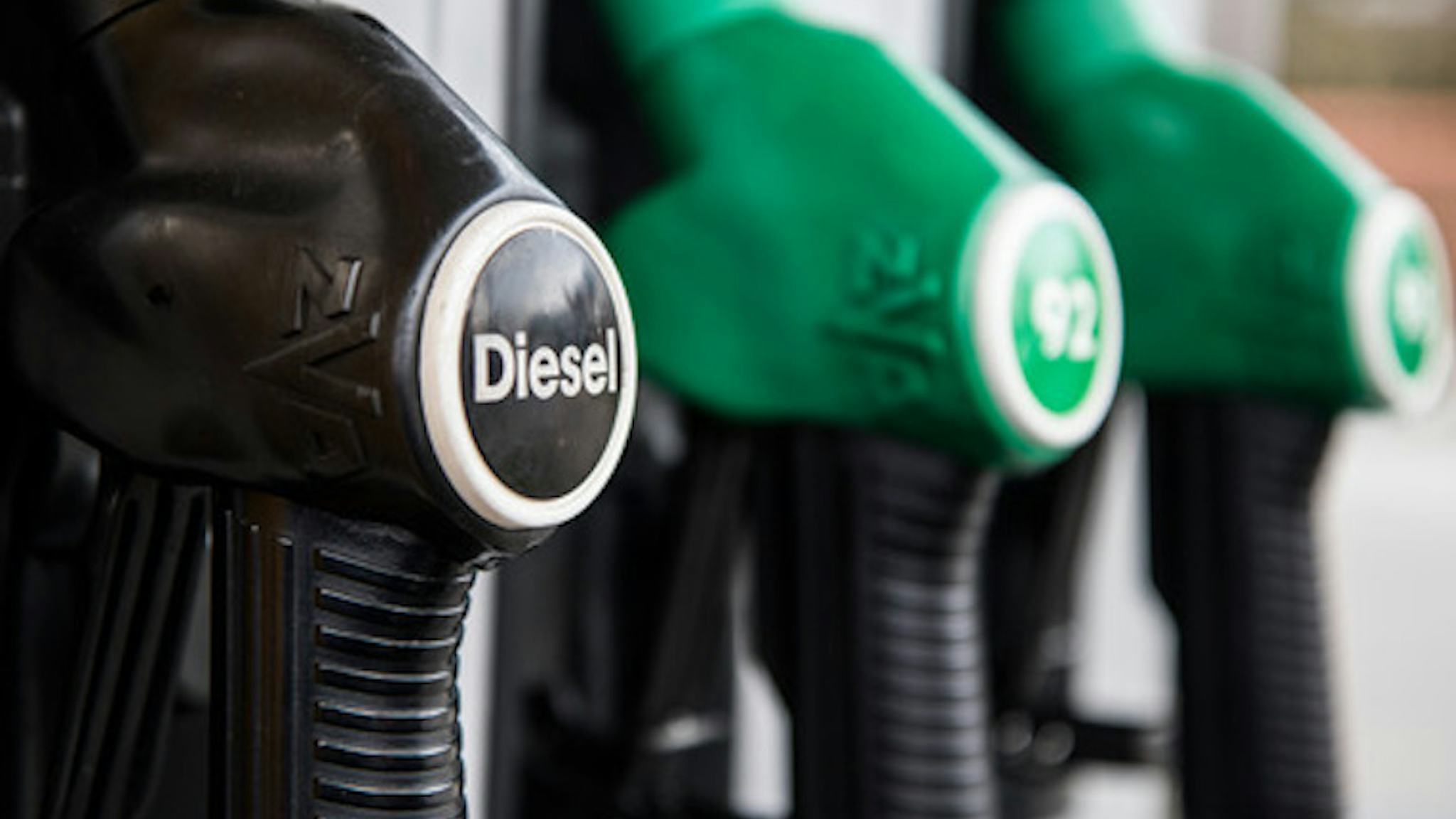
It’s just before six in the evening. A buzz comes from the door of the apartment building in Marienplaz, it unlocks.
Philipp Bucholz opens the door and scampers up the stairs. A few floors up, he stops and turns, methodically working his way downwards through the building. He rings on doorbells. When someone opens, he stretches out his hand. In it he bears a small bag with sunflower seeds and a brochure.
ALSO READ: ELECTION DEBATES IGNORE LOW-WAGE LABOR
”I’m from the Green Party” he says and hands over information about the upcoming elections.
On the 24th of September, Germany is holding elections and Philipp Bucholz is concerned about the pollution in his city.
Stuttgart is sometimes called one of the worlds four Motor cities (the others being Detroit in the US, Toyota in Japan and Turin in Italy). Many of the people living here in the state of Baden-Württemberg are dependent on the auto industry.
It is one the richest regions in the country. Unemployment is at 2%, which is low even at German levels.
This is Mercedes homeland. Mercedes is also the car manufacturer most heavily associated with diesel engines.
Yet, at the same time, Stuttgart is the city that has been among the most active in efforts to stop diesel driven traffic. Here, smog is among the worst in Germany, due to the high mountains that surround the city center which hinders particles from blowing off in the wind.
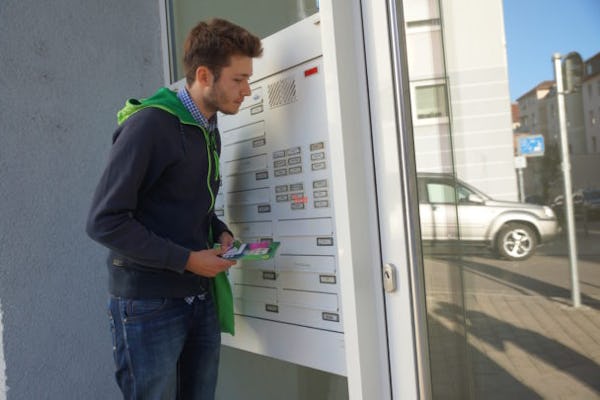
Philipp Bucholz.
Philipp Bucholzis working hard to increase the Green Party’s popularity among voters. He explains that he is doing what he can to decrease his own ecological footprint. He doesn’t eat meat. He cycles and is politically active. He works for a company in the Daimler corporation, that also own Mercedes.
”It’s a small start-up called Moovel. We are trying to develop traffic solutions for smart cities. I have great hopes that self-driving electric cars will decrease emissions”
The Green Party though are divided.
In 2011, Winfried Kretschmann won the state elections in Baden-Württemberg, thereby becoming the first Green party politician to be Minister President. He is though controversial in many ways.
”A few months ago many members of our party reacted to his statement that he neededto buy a real car, a diesel car, because he had to tow a heavy load for his grandchildren. There were more people in Stuttgart than elsewhere reacted negatively to it because of the pollution problems”, says Philipp Bucholz.
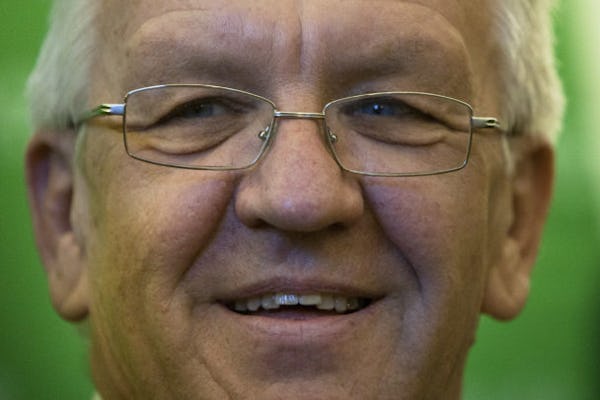
Winfried Kretschmann, the Green Party in Baden-Wuerttemberg.
The Minister President Winfried Kretschmann recently made a statement in which he emphasized the importance of protecting the auto industry and claimed the world needed modern diesel engines in order to deal with climate change.
One day closer to the election. The street markets on Köningstrasse in central Stuttgart are in full swing.
Market stands are stacked with carrots, grapes and mushrooms. Even though it’s a weekday morning, plenty of people pass through the street market. Among the stands, is a small table with a parasol. Iris Ripsam represents the Christian Democrats who dominate the present government. She has been a member of the national parliament, the Bundestag. Today she speaks with passer-byers and greets acquaintances.
”For me the main issue in the elections is making sure that families end up with more money”, she says and adds immediately that she also thinks it is important to deal with the pollution caused by diesel engines.
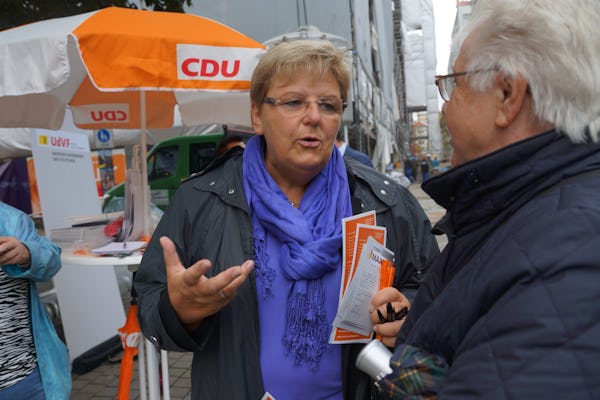
Iris Ripsam, CDU.
The opinion that the auto industry and pollution is an important issue is shared by many. And yet, it hasn’t quite become a major issue as the election grows nearer.
The impression is that all parties, all unions and all businesses share the dilemma of wanting cleaner air, but are unwilling to pay a price of job losses.
The pollution manipulation scandal has hurt sales of diesel cars, and the sharp drop puts many jobs in jeopardy. In Germany alone, more than 800 000 jobs are connected to the manufacturing of diesel cars.
Angels Merkel’s rival for the position of German chancellor, Martin Schulz has tried to use the diesel scandal as a battering ram to break the strong hold the Christian Democrats have on their voters.
He has said that Merkel protects the higher earning managers of the auto industry rather than making sure that millions of low earners can have a salary that they can live on. Schulz’s tactics though do not seem to work.
The German labor movement is also split. In a recent interview for German radio Jörg Hofman, the chairperson of IG Metall, felt it was dumb to bring the diesel issue into the election debates. He would prefer to emphasize the risk that more of his members may lose their jobs.
There are many other union members that call for harsher restrictions on the auto industry. Andrea Schiele chuckles a little when she is asked what it is like to be stuck in-between.
She is having lunch at a restaurant next to the large union building in Stuttgart where she works for DGB, the umbrella organization for German trade unions.
“It isn’t easy”, she says.
Members of IG Metall and the coal industry union IG Bau often have a very different point of view than the shop workers in the services workers union Ver.Di.
IG Metall for example are quite satisfied with the decision to recall 5.3 million diesel cars for a software update in order to reduce pollution emissions. Voices from other sections of the labor movement demand changes in the hardware, as engines that need to be modified in order to improve the environment.
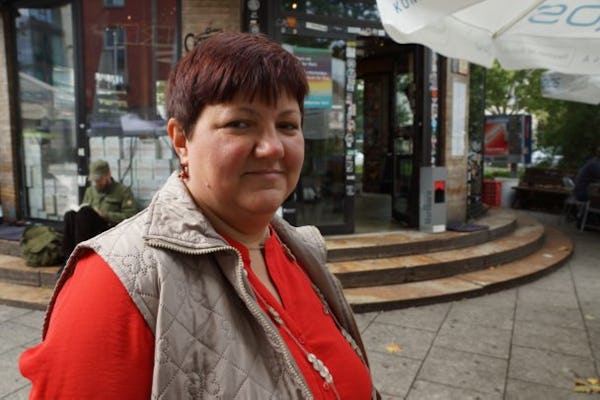
Andrea Schiele, DGB.
Andrea Schiele says that her opinion is that the most important issue is to lower emissions in Stuttgart although that is actually isn’t a very good solution.
“People have heard year after year that diesel cars are so good for the environment, but those who have bought diesel cars now risk not being allowed to drive to work anymore”
The German Election
On the 24th of September Germany will hold federal elections for the Bundestag parliament, which thereby will decide who will become the Chancellor of Germany.
Angela Merkel has been in power since 2005 and is expected to stay in office. Her Christan Democratic party CDU is expected to get mot votes according to all polls.
The Social Democrats (SPD) is led by Martin Schulz is predicted to receive the second highest amount of votes.
The key question is what kind of coalition will be in government. At the moment, CDU and SPD share power, but there is speculation that a future coalition between CDU and both the Green Party and the liberal Free Democratic Party (FDP) is possible.
It is most likely that the political map of Germany will be re-drawn since the right-populist AFD, Alternative for Germany, is expected to get into the parliament.
The Diesel Scandal
In the summer of 2015 it was revealed that Volkswagon had been manipulating the emission levels on diesel engines. The engines have been fixed in order to decrease exhaust levels during a lab test, but then would increase nitrogen oxide emissions (noxemissions) when the car is driven on a normal road. Later, other car manufactures were revealed to have cheated in a similar manner.








